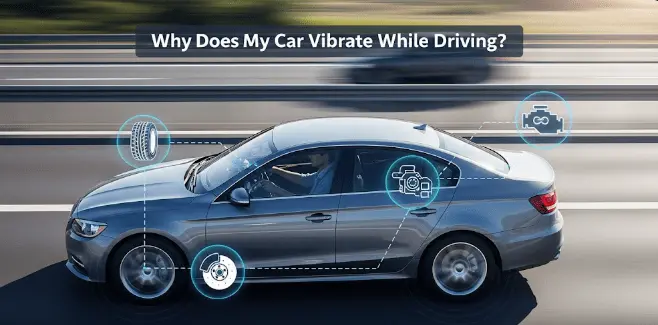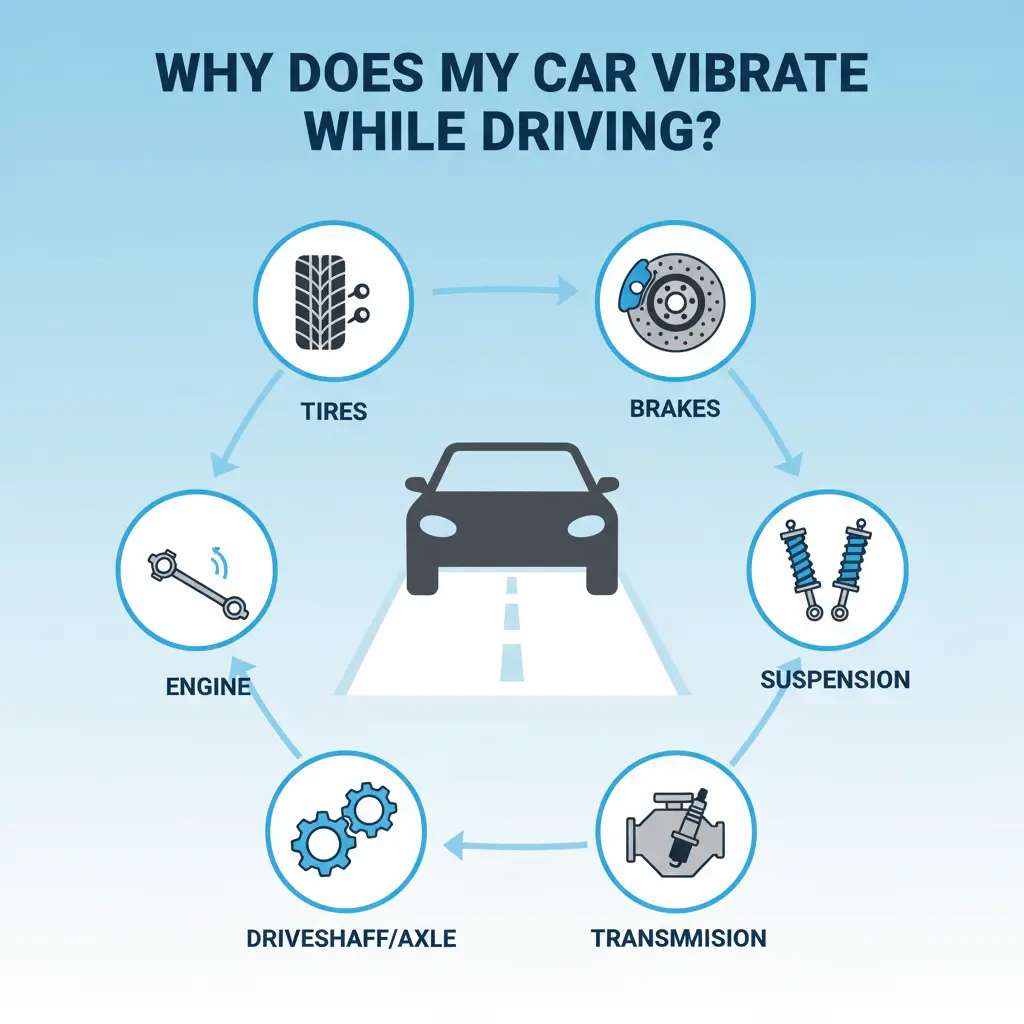
It should be a pleasant experience; however, if your car begins to shake or vibrate and tremble, it could be frustrating and alarming. The car’s vibrations during driving are common and may be caused by minor wear and tear or more serious mechanical issues. Neglecting these vibrations can result in more severe problems, such as lower safety, an increase in fuel, and even costly repairs.
In this comprehensive guide, we’ll examine the most prevalent causes of car vibrations. We’ll also discuss how to recognise the cause, possible solutions and strategies for preventing. The shake can occur when driving at high speeds, while slowing down, or when you are at idle. Identifying the root of the issue is essential to returning to the road in a safe manner.
This article is based on knowledge from experts in the field of automotive and reliable sources that can assist you in identifying the problem. If you’re experiencing any vibrations, it is always recommended to speak with an expert mechanic to conduct a thorough examination.
Understanding Car Vibrations: Types and When They Occur
Car vibrations may manifest in various ways, but they are often able to provide clues to the root of the issue. For example:
- Vibrations that occur at certain speed Most often connected to tires, wheels or drivetrain parts.
- Shaking when you accelerate The shaking could indicate transmission or engine issues.
- Vibration during stopping generally it involves your brakes.
- Shaking during the idle It is usually engine-related problems like mountings or misfires.
- The steering of your wheel is shaking It is a common issue when it comes to steering, suspension, or wheel alignment issues.
Being aware of these patterns could help pinpoint the source. Let’s take a look at the most likely reasons that your car could be shaking.
Common Causes for Why Does My Car Vibrate While Driving?

1. Tire and Wheel Issues
The wheels and tires are the primary points of contact with the roadway.
As such, problems with them are among the top sources of vibration. These problems are usually worse when you drive at a greater speed (around 50-70 miles per hour) and may feel like an unsteady shaking of the steering wheel or even the entire vehicle.
- Unbalanced Tires: If tires aren’t balanced they can’t distribute their weight evenly, which causes vibrations that rise with speed. This may occur after hitting a pothole, or because of normal wear. The symptoms include a constant shake that may disappear after a certain speed.
- Fix: Contact a professional balance your tires with tiny weights on the wheels. Cost: Typically $10-20 for each tire.
- Old or worn tires As tires age, they degrade (usually 3 to 5 years, or 40,000 to 60,000 miles) and can result in uneven wear of the tread and flat spots or a separation. The result is a shaking or bouncing particularly on roads that are rough. A low tire pressure can cause this.
- Repair: Inspect the tire tread (use the penny test – if Lincoln’s head is visible Replace the tires) and rotate the tire every between 5,000 and 7,500 miles. Replacement costs: $100-200 per tire.
- Tires that aren’t rolled properly can develop egg-like shapes due to poor storage, manufacturing flaws or excessive braking which can cause a bouncing feeling. This constant vibration can cause damage to suspension parts. Adjustment and rotation may assist, however the most severe cases will require new tires.
- Broken or damaged wheels The impact of hitting potholes, curbs or accidents may cause bends to wheels, which can cause vibrations throughout the steering wheel. Runout (deviation from the perfect circle) more than half an inch can be problematic.
- Solution: Measure runout at a repair shop and replace the damaged wheels ($100-300 per ).
- Loss of Lug Nuts: When the lug nuts become loose (often after tire repair) wheels may be swaying, causing hazardous vibrations.
- Fix: tighten them as soon as you notice or seek assistance from a professional If the issue persists.
- Wheel Misalignment: Wheels that aren’t perpendicular or parallel to ground cause vibrations and pulling at high speed. It is a common occurrence after potholes or accidents. Repair professional align ($50-100 ).
When it’s wintertime, ice and snow accumulation on wheels can resemble the problems. Clean them up first.
2. Brake System Problems
If you notice that vibrations are most prominent when you press the brakes it is most likely within your brake system. This can affect the stopping strength and safety.
- Warped Brake Rotors/Discs generated by braking heavy can cause warping of discs and rotors. This can lead to pulsation of the brake pedal as well as in the steering wheel. Symptoms: Shaking intensifies during braking. Solution by resurfacing or replacing the rotors ($150-300 depending on the axle ).
- Wear and tear Brake Pads Inequal wear results in vibrations as pads are not able to grip rotors evenly. Solution Replace pads ($100-200) and examine the rotors.
Be sure to address any brake issues immediately, as they impact vehicle control.
3. Engine and Transmission Issues
Engine-related vibrations are often felt like a shuddering sound and may occur during acceleration, idle, or at constant speed.
- Engine misfires are caused by defective spark plugs or wires, or even issues with air intake and fuel (e.g. dirty seals or filters). The symptoms are jerky the acceleration, or idle shake. Solution Change the spark plugs ($50-150) and filters ($20-50 ).
- Broken Transmission Mounts or Engines The rubber parts absorb vibrations. If they wear shakes can transfer into the interior of the vehicle. This is common in vehicles with high mileage. Solution: Replace the the mounts ($200-500 ).
- Timing Belt Failure A damaged or loose belt can disrupt engine timing, which causes idle vibrations. Fix: Replacement ($500-600 average).
- Additional Engine Components Problems such as a damaged radiator fan or an improper fuel mix can result in periodic shaking.
4. Suspension and Steering Problems
Suspension problems often result in the sensation of a wobbly, loose feel particularly over bumps.
- Damaged Suspension Parts Ball joints or tie rod ends or bushings wear down which causes shakes in the steering wheel as well as an uneven alignment. Repair professional Inspection and Replacement ($200-600 ).
- Power Steering Problems The presence of leaks or low fluid can create vibrations in the turns. Repair top off fluid or fix any leaks ($50-100 ).
5. Axle and Drivetrain Problems
These can affect the power supply and are commonly found in all-wheel-drive or front-wheel-drive vehicles.
- Driveshaft or Axle Bent Due to potholes, accidents or other that cause shakes in response to speed. Fix: Replace or repair ($150-300 ).
- Damaged CV Joints or U-Joints: Damaged boots let dirt get in, which causes vibrating and clicking when acceleration is applied. Fix: Replace joints ($200-400).
How to Diagnose Car Vibrations
- Take note of the Conditions. How often does it occur? (e.g., speed, braking, idle). This helps narrow the cause.
- Visual Inspection: Examine tires for wear pressure (use the gauge) and damages. Examine the underside of the vehicle for leaks or broken components.
- Testing Take a drive Accelerate slowly, stop firmly and turn around to replicate problems.
- DIY Checks: Place a coin on the dashboard. If it falls with certain speeds, then it’s due to vibration. Verify lug nuts by using an adjustable wrench.
- Professional Assistance Utilize diagnostic tools in shops for codes (e.g. engine misfires) or wheel balancers.
If you feel that vibrations are intense or are accompanied by sounds, stop the vehicle then tow your vehicle.
Solutions and Repair Costs for Why Does My Car Vibrate While Driving?
Most fixes involve routine maintenance:
- Tire balancing/alignment: $50-150.
- Brake repairs: $150-500.
- Engine tune-up: $100-300.
- Suspension/axle work: $200-600+.
Costs differ based on the location and vehicle; request estimates from reliable mechanics.
Prevention Tips
- Regular maintenance : Refer to the instructions of your owner’s manual to rotate tires, check the fluids and check brakes every year.
- Take care when driving: Avoid potholes, curbs and reckless driving.
- Monitor Tire Pressure: Check monthly; underinflation causes uneven wear.
- Seasonal Checks: Clear winter debris; replace worn parts promptly.
- Mileage Milestones at 50.000 miles, you should inspect the belts, mounts, as well as joints.
If you are vigilant, you can minimize vibrations and increase the duration of your vehicle’s longevity.
When to See a Mechanic
It is recommended to make your appointment with a professional in the following situations:
- Vibrations are getting worse over time.
- The steering feels loose or unstable.
- Vibrations occur even at low speeds.
- You hear clunking, grinding, or squealing noises.
FAQs
1. Can you drive on the car’s vibrations?
The slightest vibrations may be fine for a short time, but the more severe vibrations could indicate safety concerns like brake problems. Make sure to check it out immediately.
2. Why is my car vibrating at high speed?
The most common cause is tires are in alignment, and misalignment and bent wheels. Align and balance them.
3. What is the cause of shaking during stopping?
Rotors that are warped are typical. Check your brakes.
4. Why does my car shake when I idle?
Engine problems wear mounts, a worn-out engine or timing belts that are worn. Make sure that the spark plugs are clean and filtering is in order.
5. Do low tire pressures cause vibrations?
Yes, it causes unbalanced wear and shaking. Follow the suggested PSI.
6. What is the cost to correct the vibrations in your car?
It depends on the cause. $50 for balancing up to $600+ for a new axle.
7. Why is my car shaking while accelerating?
Wear and tear of the CV joint could indicate engine issues. Inspect drivetrain.
8. Are new tires causing vibrations?
If the balance is not correct If the balance is not correct, sure. Always balance after installation.
9. What if vibrations began when you hit the pothole?
Most likely, the wheel is bent or axle. Make sure you align and check the wheel.
10. What is the best time to see a mechanic about car shakes?
immediately, if the problem is severe that it affects steering/braking or gets worse quickly. Don’t risk safety.
Final Thoughts
The car’s vibrations during driving shouldn’t be overlooked. While some causes are minor — like an imbalance in tires, other causes could point to major mechanical issues. The best method is to identify the time the vibrations begin and from where and then implement corrective actions. Regular maintenance, frequent inspections, and high-quality parts can keep your vehicle running smoothly and safe. It will also be free of vibrations.